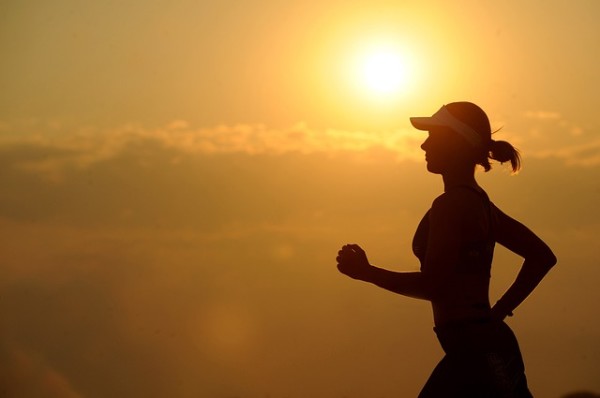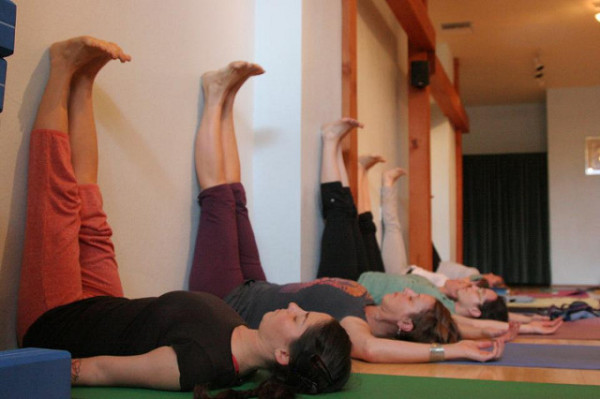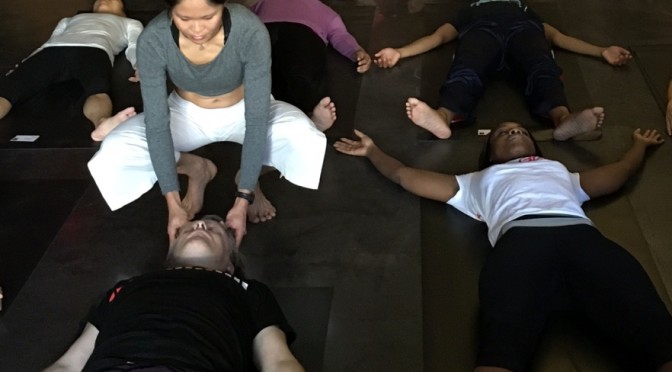There’s a war raging in your body!
Win it through the path of least resistance.
This post first appeared on the Yoga 216 blog. It is reposted here with permission.
When we are facing stressful situations, the sympathetic nervous system is on alert, automatically recalibrating to increase blood pressure and heart rate and reduce digestion, to prepare the body for battle. Needless to say, our contemporary workaday lives, which is full of stress and sensory overload – tracking indices and social channel updates, digging ourselves out of a bottomless inboxes, rushing from meetings to lunch, to meetings over lunch – place a constant stress on us and trigger this ‘fight or flight’ response all the time.

When we are time starved, we often try to have an efficient workout, either by going for a hard run or a bootcamp session or choosing physically demanding yoga sessions. Perhaps these are efficient from a burning calories standpoint and, with discipline, speed, muscle build-up, weight loss and other results can be attained. But are they giving us overall health, vitality and balance?
With our relative physical inactivity, from desk-bound jobs, elevators and surfing the Internet, getting into weekend warrior mode with high-intensity workouts jolts the body’s system.
Restoring the Body through Yoga
Where it comes to physical yoga, slowly building up the practice with discipline, and keeping it a regular part of a healthy, balanced lifestyle is better than a strong dose once in a while. More importantly, it is critical not to neglect the counterpart of active yoga – the more restful, effortless style of yoga practice often called ‘restorative yoga’. It is so called precisely as it replenishes and renews the practitioner, with the body slowly eased into shapes. Poses are held for up to 10 minutes at a time, supported by various props and gravity.

Sleepless in the City
Now you ask, to quiet our ‘fight or flight’ response, why don’t we just get to bed earlier? Proper deep sleep turns on the parasympathetic response of the nervous system, which has the beneficial effects of lowering blood pressure and heart rate and increasing digestion, and also promotes cellular regeneration. It unleashes our capacity to heal ourselves from within.
However, many of us are not actually getting the proper rest that is so crucial for these restorative processes to happen. A combination of city noise (including light and actual sound pollution), mental noise and tension arising from chronically held stress, strain from late nights, irregular and imbalanced work and rest hours and meal times, keeps the mind-body in constant duress. We may not even get to the deep sleep stages of the sleep cycle.
Chronic Lack of Rest is Debilitating
After a strenuous physical workout, it may take you perhaps a day or two for the muscle soreness to go away, but your nervous system takes a much longer time to recover.
Have you ever noticed that nagging fatigue, the feeling that you’re just not ready to start the week ahead? It can be from the lack of proper rest and an over-active sympathetic response.
Our bodies need proper rest for the vital systems to rebuild to compensate for the stress that we subject them to. Without good quality rest, there’s no chance for cellular repair and regeneration to take place. Athletes too under-perform when they are over-trained. Mark Jenkins gives a succinct explanation here.
In the United States, according to the CDC, heart disease is the leading cause of death for both men and women. It is a lifestyle disease caused by a variety of factors, including poor diet, irregular and lack of physical exercise, but a constantly stimulated nervous system is also a factor for heart disease. It is a likely explanation for hormonal imbalances, chronic pains, diabetes, allergies, etc. As long as we don’t give our bodies the chance to heal, we’d be depleting our overall immunity and wearing down the other essential functions of the body over time.
Restorative yoga is not optional, it is essential to our continued vitality! We all need these self-care therapeutic sessions. Try starting your week, or day, with it.
If short on time, practise ONE restorative poses for 10 to 15 minutes as a pick-me-up anytime your energy feels like blah…).
Like most skills, relaxation takes practice! Start with some guidance, and include it as a conscious time out in your schedule. It’s your weekly ‘Top-Up’!
Sign up now if you want to receive more love from Spice Yoga to you. Our Mindful Monday newsletter (sent periodically, no spam!) features original writings, and early bird notification and discounts to upcoming online and in-person events, trainings, and retreats. Also, you’d receive suggested videos, tutorials, podcasts, readings and more, to inspire your learning and to take you deeper into your personal practice.
[mc4wp_form]
[After signing up, add ask@spiceyoga.com to your email address book to ensure you receive future mailings.]

